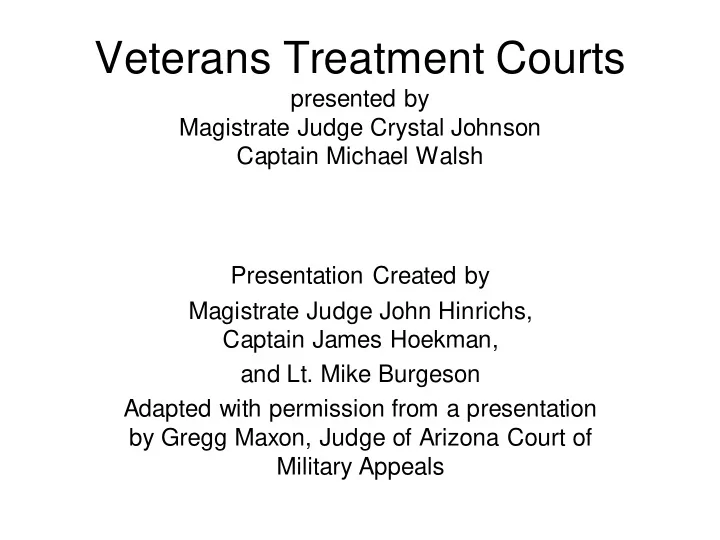

Veterans Treatment Courts presented by Magistrate Judge Crystal Johnson Captain Michael Walsh Presentation Created by Magistrate Judge John Hinrichs, Captain James Hoekman, and Lt. Mike Burgeson Adapted with permission from a presentation by Gregg Maxon, Judge of Arizona Court of Military Appeals
Statistics • 229,000 veterans in local jails and state and federal prisons • 400,000 on probation • 75,000 on parole • Make up between 9% - 10% of prison population • 1.16 million veterans arrested in 2007 (10% of all arrested adults.)
Recently Returned Veterans • 2.4 million served in Iraq and Afghanistan • 1.44 million now eligible for VA health care • 774,000 have obtained VA health care • Top three diagnoses: – Musculoskeletal ailments 56% – Mental disorders 52% – Symptoms, Signs and Ill-Identified conditions 51%
Rand Study (2008) • 27%-33% at risk for mental-health problems such as PTSD and major depression • About 320,000 veterans have experienced traumatic brain injury
Mental Health Conditions • Post Traumatic Stress Disorder 217K • Depressive Disorder 165K • Neurotic Disorder 143K • Affective psychosis 100K • Alcohol dependency syndrome 47K • Non-dependent abuse of drugs 33K • Drug Dependence 25K
Need For a Program • Link between stress of military service and involvement in the court system • Growing number of veterans appearing on dockets with substance abuse issues • Traditional social services not equipped to address combat stress • Need to engage VA, State Vets Depts., veterans orgs., and family support groups • First Veterans Court in US was in Buffalo, NY Jan 1, 2008
South Dakota Senate Bill 70 • SB 70 was signed into Law Feb 7, 2013 – Specialty Courts • Criminal Justice System and Veterans Justice Outreach Services July 1, 2013 • Three Pilot Veteran Treatment Court, Watertown, Rapid City, and Minnehaha County. Watertown July 3, 2014
SDCL 23A-27-52 – Defendant serving in military or veteran • If a defendant appears in court and pleads guilty or no contest to a crime punishable as a felony or Class 1 misdemeanor, the court shall inquire whether the defendant is currently serving in or is a veteran of, the United States Armed Forces. If the defendant is currently serving in the military or is a military veteran, the court may: • (1) Order that a court services officer consult with the United States Department of Veterans Affairs or another agency or person with suitable knowledge or experience, for the purpose of providing the court with information regarding treatment options available to the defendant, including federal, state, and local programming; and • (2) Consider the treatment recommendations of any diagnosing or treating mental health or substance abuse professionals together with the treatment options available to the defendant in imposing sentence.
Minnehaha County • From July 1, 2013 to June 30, 2014, Minnehaha County identified 562 veterans. • Minnehaha County Court Services (probation) supervised 58 veterans during that period.
Veterans Courts • Are NOT a free pass • They are: – Problem solving courts – Utilizing rigorous treatment programs – Emphasizing personal ACCOUNTABILITY
Justification for the Program (Moral Justification) Veterans Treatment Courts present an opportunity for us to come to the aid of the men and women in uniform who are suffering as a result of their sacrifice to this country and should be expanded to serve all veterans in need. General Barry R. McCaffrey (Ret)
Justification for the Program (Pragmatic Justification) “Successfully habilitate veterans by diverting them from the traditional criminal justice system and providing them with the tools they need in order to lead a productive, law- abiding lifestyle.” Judge Robert Russell Buffalo, New York Veterans Treatment Court
Justification for the Program (Pragmatic Justification) • Availability of specialized resources (VA) • Cost effectiveness – Low operational costs – Savings from: • VA treatment (no cost to local jurisdiction) • Reduced recidivism • Reduced incarceration • High success rates • Mitigates future harm
VA Response • Initiative to end Veterans Homelessness in five years • Veterans Justice Outreach Program • Addition of 1600 mental health professionals in recent years
Vet Court Key Components • Integrate alcohol, drug and mental health treatment with case processing • Non-adversarial, problem solving approach • Eligible participants identified early • Address co-occurring problems such as medical problems, homelessness, joblessness and family problems
Key Components (continued) • Frequent alcohol and drug testing • Progress measured through compliance • Ongoing judicial interaction with veteran • Monitor, monitor, monitor (Trust but verify) • Continuing interdisciplinary education for court team • Forge partnerships with VA, public agencies and community based orgs.
Best Practices for a Veterans Treatment Court Program • Vets identified, assessed and referred early to Veterans Treatment Court. • Veterans linked with program of services fashioned to meet needs. • Court staff and volunteers assist with stabilization services such as mental health counseling and safe housing. • Frequent status hearings reviewing treatment plans. • Incentives for success . Sanctions for failure . • Emphasis placed on accountability .
Impact • Graduates: – Change their demeanor and attitude – Leave program with renewed sense of pride, accomplishment and motivation. – Leave the program sober and stable and many have their charges reduced, dismissed or receive a sentence that does not include incarceration
Applicability to Civil Courts? • Many veterans face non-criminal court actions that impede their ability to get their feet on the ground: – Family law issues – Debtor creditor issues – Job related issues – Housing issues – Access to public benefits
Current Status • Program has begun with one client, and is looking at ways to expand the reach • The treatment team, the mentors, and the judge are learning each week how to best apply the methods • Several mentors approved, treatment team meeting bi-weekly
Summary Veterans Treatment Courts serve as a way for the criminal justice system to do its part in helping our nation’s Veterans to overcome the issues and obstacles in their lives and return to an honorable, productive lifestyle.
Recommend
More recommend